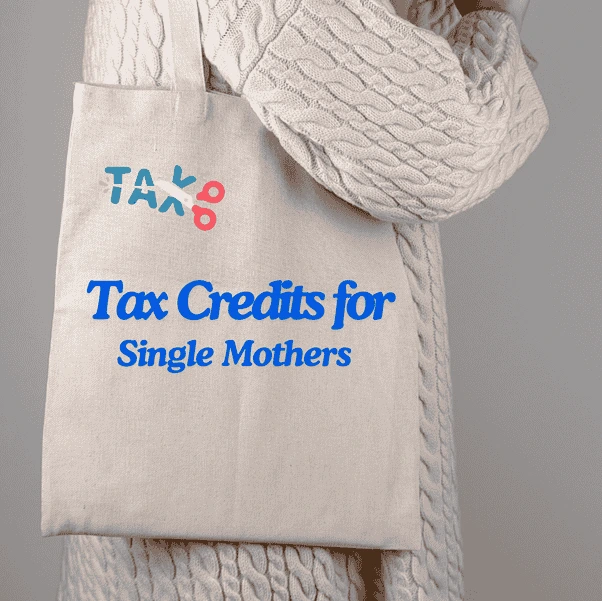
Feeling stressed about taxes? You’re really not alone—especially if you’re a single mom. Managing bills, looking after the kids, and now figuring out all this tax stuff? It’s a lot, right?
As a single mom, you can benefit from tax breaks designed to help kids.
To make things easier, we’ll go over the tax credits that might give you extra money. We’ll cover just the credits you can receive, how to qualify, and how to claim them. Navigating tax season can be a breeze with the right approach, ensuring it remains a stress-free experience!
What Are Tax Credits?

A tax credit is a direct decrease in your tax bill. Imagine it as a coupon that not only cuts down your debt but might also put some extra cash in your pocket.
So, there are basically two main types:
Refundable credits can actually lower your tax bill to below zero, so you end up getting a refund!
Non-refundable credits can help lower your tax bill, but they won’t take it below zero. No extra cash back, then.
Now, let’s explore the specific tax credits that offer substantial benefits to single mothers. These include the Earned Income Tax Credit, which can be up to $6,728 depending on income and number of children; the expanded Child Tax Credit, providing up to $3,000 per qualifying child, and the Child and Dependent Care Tax Credit, which can amount to as much as $8,000.
Tax Credits For Single Mothers

Single mothers can take advantage of various tax credits, each with specific regulations and advantages. Here are a few of the most popular tax credits:
Earned Income Tax Credit (EITC)
The Earned Income Tax Credit (EITC) really helps out working parents, especially single moms. It’s made for people with lower to moderate incomes, giving a nice lift when tax season rolls around.
If you qualify for the EITC, you might get a tax refund even if you haven’t paid any taxes. The refund amount depends on:
– Your income – How many kids you have – Your filing status, which is single in this situation.
So, let’s say you’re a single mom with two kids, and you made $18,000 this year. You might be looking at a refund of over $5,000. Wow, that’s a nice chunk of change coming back to you!
The Child Tax Credit (CTC)
The Child Tax Credit truly helps out parents a lot. This one is designed specifically for families with kids, giving you cash for each qualifying child you have. It recently got a little extra boost to help out parents.
This credit can help lower your tax bill. So, for some single moms, there might be a chance that a portion of it could be refundable. You could actually end up getting a check back, even if you haven’t paid any taxes.
Imagine you are a mom by yourself and have a child to care for. You could get up to $2,000 for every child, depending on your income. People who are parents should know about the CTC because it gives money to help with the costs of having children.
To discover more essential about Parent tax, read Tax Basics for Parents: Understanding Child Support, Child Care, and Child Tax Credits
Child and Dependent Care Credit
So, if you’re spending money on childcare while working, you might want to check out the Child and Dependent Care Credit. It’s a real lifesaver when it comes to offsetting those childcare costs, which can add up quickly!
Here’s the scoop: your credit is based on how much you spend on childcare and your income. Basically, it’s a percentage of those expenses. Can you believe you could be dropping like $3,000 on daycare just to get to work? If your income’s within a certain range, you could get some of that back!
Now, if you’re a single mom with a kid under 13 (or a child with a disability) and you’ve got a valid Social Security number, listen up! You could be in line for a sweet tax credit!
And here’s the kicker: you could snag up to 35% back on your daycare expenses! How awesome is that? For one child, you can get back as much as $3,000, and if you’ve got two or more kiddos, it could go up to $6,000! Every little bit helps, right?
Head of Household Filing Status
If you’re a single mom and covering more than half of the household expenses, you could be eligible for Head of Household filing status. This could lead to a larger tax break compared to filing as a single.
Imagine you’re a single mom named Sarah. Your son, who’s 10 years old, lives with you all the time. You’re single, and you cover all the household costs—rent, utilities, groceries, and everything else.
You can now file as Head of Household. You’ll probably enjoy a higher standard deduction—around $20,800. This can help reduce your taxable income and save you some cash on your taxes.
The American Opportunity Tax Credit (AOTC)
The American Opportunity Tax Credit (AOTC) is a tax credit that helps with the expenses of higher education. If you meet the criteria, you could receive as much as $2,500 for each eligible student during their first four years of college. That’s cash that gets deducted right from your tax bill!
If you want to qualify for the AOTC, there are a few things you need to check off your list:
To be eligible, the student needs to be enrolled in a degree or certificate program for at least half-time.
Income Limits: Just a heads up, there are some income restrictions. If you’re a single filer, your modified adjusted gross income (MAGI) needs to be below $90,000, and for married couples, it should be under $180,000.
No felony drug convictions. The student shouldn’t have a felony drug conviction.
Imagine your daughter, Emily, is just starting her journey as a freshman in college. You’re covering $10,000 for her tuition and other expenses. If you meet the requirements for the AOTC, you can get back as much as $2,500 on your taxes. That’s a pretty good amount of money that can really help out with your tax bill!
Premium Tax Credit
The Premium Tax Credit (PTC) is such a great way to ease the burden of health insurance costs! If you qualify, it can really help lower your monthly premiums based on your income and family size. So if you’re feeling the pinch with those healthcare expenses, this credit could be just what you need!
Qualifications:
- Your total income has to meet at least 100% but no higher than 400% of the poverty level (FPL) set by the government for the entire family size.
- You need to sign up for an approved health plan from the Health Insurance Marketplace.
- You have to be a US citizen, national, or legally living in the United States.
- You have to file a tax return as single, married, or separately filed, as well as a head of family or qualified widow(er).
- You need to be the parent of an eligible kid.
Imagine you’re a single parent making $40,000 a year, and you decide to get a plan through the Marketplace. Your monthly premium starts at $500, but since your income qualifies you for a Premium Tax Credit, it gets reduced to $300. Wow, that’s $200 saved each month!
How to Claim Tax Credits

Getting these credits is simpler than you probably imagine! When it comes to filing your taxes, all you need to do is fill out the required forms. If you’re comfortable with numbers, you can tackle it yourself with some tax software. But if math isn’t really your strong suit, getting a tax professional to help out is a great option too!
Here’s a handy tip:
Don’t forget to collect all your documents—like your W-2s, Social Security numbers for you and your kids, and any other income sources—before you dive in. This is going to make things a lot easier!
Summary
We totally get that taxes can feel like a big headache, especially for single moms. But understanding these tax credits can seriously help your finances! The Earned Income Tax Credit (EITC) and Child Tax Credit are really there to support you, so don’t miss out on them!
Remember, every little bit counts! This tax season, take the time to check out these credits and see how they can work for you and your family. You’ve got this, and you absolutely deserve every bit of help!
If you have any questions or want to share your thoughts on tax credits, just drop a comment below! Let’s help each other out on this journey!
Frequently Asked Questions:
1. What tax credits can single moms get?
- Single moms can tap into a few great tax credits like the Earned Income Tax Credit (EITC), Child Tax Credit (CTC), and Premium Tax Credit (PTC). These can really help with your finances!
2. How does the EITC work for single moms?
- The EITC is for low- to moderate-income workers, especially those with kids. If you qualify, it can give you a nice boost based on your income and how many children you have.
3. What’s the Child Tax Credit (CTC)?
- The CTC gives you up to $2,000 for each qualifying child under 17. It can lower your tax bill and might even lead to a refund!
4. How do I claim these tax credits?
- Just file your taxes using Form 1040 and any extra schedules needed for the credits. Make sure you have your income info and Social Security numbers ready!
5. Can I get a refund if my tax bill is low?
- Absolutely! Both the EITC and CTC can be refundable, meaning you might get money back even if you owe little or nothing in taxes.